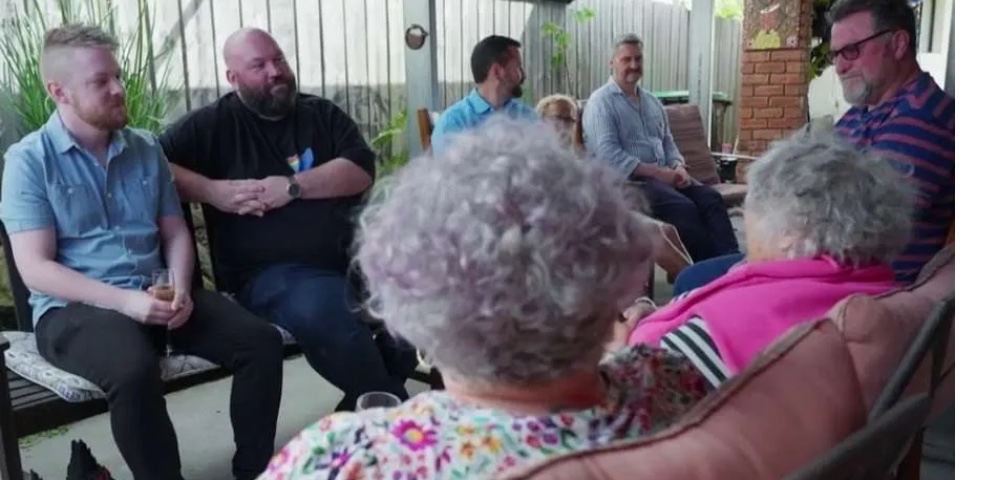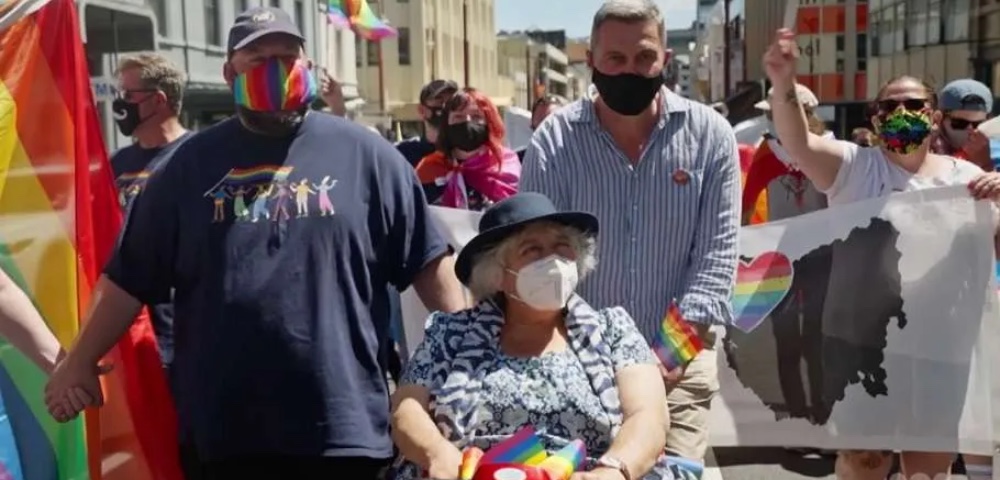
Miriam Margolyes Takes Part In Her First Ever Pride Parade In Hobart, Shares Coming Out Journey

After winning praise for Almost Australian, actor Miriam Margolyes is back on TV screens with her new docuseries on ABC.
The first episode sees Margolyes taking part in her first ever Pride parade in Hobart, with renowned Tasmanian LGBTQI activist Rodney Croome.
“It was a privilege to have Miriam Margolyes highlight how Tasmania has gone from worst to best on LGBTIQA+ human rights,” .
Tasmania Was The Last Place In Australia To Decriminalise Homosexuality
In her journey of unmasking Australia’s cultural crumbs, Margolyes arrives in Tasmania in the first episode. Not only does she get a chance to communicate with and unpack intricacies in the lives of Aboriginal Australian, but she also stumbles upon Croome in Ulverstone – a town of 15000 people at the mouth of Leven River.
In the episode, Croome takes her through LGBTQI history of the region. “[Ulverstone] is probably the most important place in Tasmania for us to [fly the rainbow flag]. Tasmania was the last place in Australia to decriminalise homosexuality,” Rodney said.
The level of discrimination against homosexual people was unimaginable back in the time.“When we were trying to decriminalise homosexuality, there were large anti-gay rallies in Ulverstone. Hundreds of people came from all over in the civic centre to protest against LGBTIQ people in the late eighties,” he said. “The speakers were inciting the crowds to even higher levels of hatred. The crowds were shouting ‘Kill them! Kill them!’”
Anti-Gay Rallies In Tasmania
“Meeting Rodney was a very emotional experience. The pain, the trauma that he had gone through was something I could hardly believe,” says Margolyes.
Margolyes revisits some “truly shocking” footage from anti-gay rallies of the 1980s. Homophobia was not just palpable; it was spilling out of every corner of that civic centre in some sort of vile insensible victory.
“The act of homosexuality is unacceptable in any society, let alone a civilized society,” said one leader from the footage to a crowd that cheered for him. “If my grade 9 daughter comes home with literature from the local high school where it talks about homosexuality being a sexual preference… I think it’s time for us to stand up,” said another man clad in a suit amidst the audience.
Dressed in a dark coat and sweater, Rodney stood in a corner of the hall, watching the crowd with a fearful yet obstinate gaze. Unwilling to give up just yet. “To stay and keep fighting like that- I’m just full of admiration,” Margolyes says.
Did Not Feel The Need For Taking Part In Pride Parade, Says Margolyes

Rodney narrated stories of young men who died by suicide since they were unable to handle the levels of hatred they faced.
“The saddest [story] was that of a young guy named Nick. He could not bear being here anymore because of this hatred. He also could not bear to leave his family, friends, and the place that had shaped him up to be who he was. So, he wrote a suicide note saying ‘I can’t stay but I can’t leave’” Rodney said. “He killed himself.” This is the reason why Croome says he dedicated his entire life to ensure that people like Nick feel like they belong in that community.
Margolyes who has been with her partner Heather for over 54 years, said she had not felt the need to be a part of any gay group or movement since she felt that it was not really “her thing.”
However, she has a change of heart after meeting some of the families who had lived through the worst times of homophobia in a local gay pride gathering in suburban Ulverstone. She meets a gay man named Garry whose parents were initially hesitant to accept their son’s sexuality.
“I’ve certainly become more and more positive as I’ve gone along from that day on,” says Garry’s dad who was initially unhappy when he discovered gay porn in his son’s room.
Margolyes’ Coming Out Journey
Margolyes shared her own coming out experience in the episode.
“I told my mother, and she was utterly devastated. My parents were Jewish. My father was a doctor so you’d think he would be a bit clued up,” she says. “But no, not when it was his daughter. It wasn’t possible.”
Seeing Garry with his family made Margolyes wish she could have brought her family to that meeting. “Maybe, they would’ve felt differently about me,” she says wistfully. “Maybe, they wouldn’t have been so horribly disappointed in me.”
“Garry’s parents are proof that people can change. Real progress can happen in a lifetime,” she says “There are people of such commitment and courage, I can’t help but drink in some of their fire. If you can drink fire, I drank it in Tasmania.”

The Struggle For ‘Fair Go’ Is Not Over
“The bigoted state that so many of my new friends grew up in has all but vanished. Tassie now boasts the most progressive LGBTQI laws in Australia,” Margolyes says towards the end of the episode. Despite not being one to express her Pride on the streets, Miriam says she had the privilege of always feeling loved unlike many who had had to fight for their very existence.
“Although the struggle isn’t over, I’m proud to march- or roll rather- right along with them,” she says.
The struggle truly is not over as the Australian Christian Lobby recently opposed a potential ban on so called conversion therapy in Tasmania last week. The state’s Premier Jeremy Rockliff has said that his Liberal government will ban the practice.
“[LGBTIQ people] are still fighting today,” Margolyes concludes. “The fair go in Tasmania is something that has to be fought for. It doesn’t come naturally or easily. That fight has to continue.”









